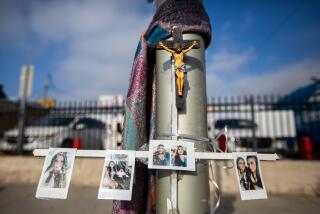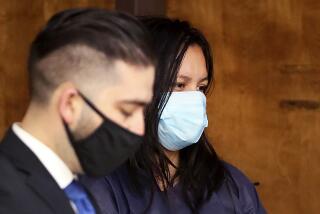Last of Testimony Targets Caro Clock
The final day of testimony in the Socorro Caro triple-murder trial on Tuesday was consumed by arguments over a stopped grandfather clock in the defendant’s Santa Rosa Valley home.
The upright clock had stopped at 10:59 p.m., about the time the three Caro boys, ages 3, 8 and 11, were gunned down in their beds.
Witnesses testified that Dr. Xavier Caro, a Northridge rheumatologist, saw the stopped clock a few days after the Nov. 22, 1999, slayings, noted the time and told police. He alleged that his wife stopped the clock to mark symbolically the time of the killings. The defense alleges Caro stopped the clock himself as part of a scheme to frame his wife for the slayings.
Socorro Caro, 44, is charged with shooting three of her four sons at close range with a .38-caliber handgun. She then allegedly shot herself in the head, but survived. Prosecutors said she killed the children to punish her husband, who was having an affair and seeking a divorce.
Caro has pleaded not guilty and not guilty by reason of insanity. She faces the death penalty if convicted. Her husband has not been charged.
The trial started in August and closing arguments are to begin Thursday.
On Tuesday, the prosecution brought in Hercel Shultz Jr., a boyhood friend of Xavier Caro, to ask when Shultz first spotted the stopped clock.
Shultz, who lives in Brawley near the Mexican border, had been called by Xavier Caro a few days after the slayings to come to Ventura County for a visit.
Shultz said he noticed the stopped clock immediately on entering the house and said it was “creepy” that the time was 10:59.
“We were standing by the clock and Xavier said, ‘Dang, did that clock stop again? I just got it fixed,’ ” Shultz told the jury. “He noticed it was 10:59 and said, ‘Maybe I should get a police officer.’ ”
Earlier this month, the defense brought in a witness who once sold and restored grandfather clocks. The man, now a real estate salesman, testified that only a sharp jolt or manipulation would have stopped the clock, according to the pictures he saw.
But prosecutors on Tuesday brought in James Bultema, a clock repairman and owner of the Clock Gallery in Thousand Oaks, who said grandfather clocks that haven’t been serviced every two years could stop on their own for any number of reasons.
Excess dust often stops grandfather clocks, he said.
“I tell my clients that dust is the No. 1 enemy of clocks,” he said.
He also said it was impossible to tell how a clock stopped by looking at a picture of it.
Assistant Public Defender Jean Farley hinted that the dust on the pendulum of the Caros’ clock might have gotten there when police were dusting for fingerprints.
Both sides will discuss jury instructions today and are expected to sum up their cases on Thursday and Friday.
More to Read
Sign up for Essential California
The most important California stories and recommendations in your inbox every morning.
You may occasionally receive promotional content from the Los Angeles Times.










